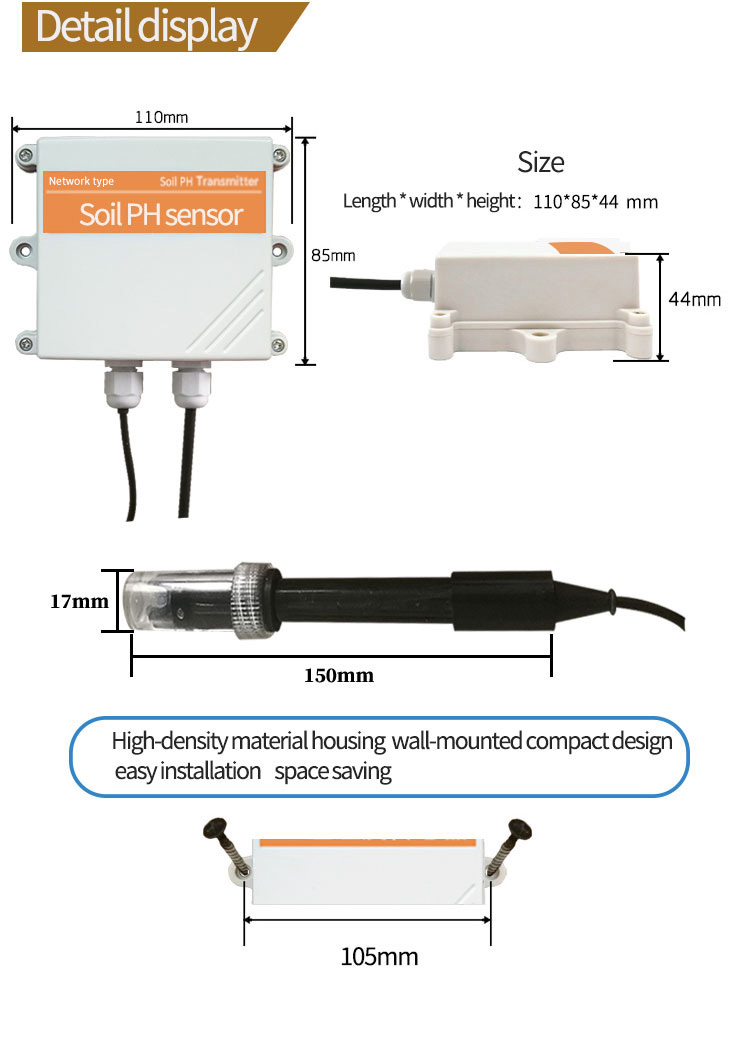In today's world, sustainable agriculture practices are essential in order to meet the growing demand for food while minimizing environmental impact. Innovative technologies, such as soil sensors, have revolutionized the way we understand and manage soil health, leading to improved crop yield and resource efficiency. This article explores the applications and advantages of cutting-edge soil sensor technology in optimizing agricultural practices and promoting sustainable farming methods.
Real-time Monitoring:
One of the key advantages of soil sensor technology is its ability to provide real-time monitoring of soil conditions. Traditional soil analysis methods involve time-consuming laboratory testing, which may not be practical for immediate decision-making. Soil sensors, on the other hand, provide instant data on important parameters like moisture content, temperature, pH levels, and nutrient availability. This real-time information allows farmers to make timely adjustments in irrigation, fertilization, and other management practices, ultimately improving crop yield.

Precision Agriculture:
Soil sensors play a crucial role in precision agriculture, which focuses on optimizing resource use and minimizing waste. By installing soil sensors throughout fields, farmers can gain insights into the variability of soil conditions across different areas. This enables targeted application of water, fertilizers, and pesticides, avoiding unnecessary usage and reducing environmental impact. Precision agriculture techniques, powered by soil sensor data, lead to higher crop yields, reduced costs, and sustainable farming practices.
Efficient Water Management:
Effective water management is essential for maximizing crop yield while conserving water resources. Soil sensors provide detailed information on soil moisture levels, enabling farmers to accurately determine when and how much to irrigate. By avoiding over- or under-irrigation, crops receive adequate water, ensuring optimal growth and minimizing the risk of water stress. Additionally, soil sensors can be integrated with irrigation systems, allowing for automated and precise control of water application based on real-time data.
Nutrient Management:
Proper nutrient management is critical for healthy plant growth and high crop yields. Soil sensors enable farmers to monitor nutrient levels in the soil, ensuring that plants receive adequate nutrition throughout their growth stages. By accurately assessing nutrient availability, farmers can adjust fertilizer application rates and timing to meet the specific needs of crops. This targeted approach minimizes nutrient wastage, reduces environmental pollution, and maximizes the efficiency of nutrient utilization, leading to improved crop yield.
Disease and Pest Management:
Soil sensors contribute to effective disease and pest management strategies, ultimately improving crop productivity. Certain soil properties, such as moisture and temperature, play a crucial role in determining the presence and activity of pathogens and pests. By monitoring these parameters using soil sensors, farmers can anticipate and respond to disease and pest outbreaks promptly. Early detection allows for timely intervention, such as targeted pesticide application, reducing crop losses and ensuring higher yields.
Soil Health Assessment:
Healthy soil is the foundation for productive farming systems. Soil sensors provide valuable insights into soil health by measuring parameters such as organic matter content, compaction, and pH levels. This information helps farmers assess soil quality, identify areas that require remediation or improvement, and implement appropriate management practices. By actively monitoring soil health using sensors, farmers can develop sustainable soil management strategies, maintain soil fertility, and maximize crop yield in the long term.
Data-driven Decision Making:
Soil sensor technology generates vast amounts of data, which can be leveraged to make informed decisions and optimize farming practices. By collecting and analyzing historical data from soil sensors, farmers can identify trends, patterns, and correlations between soil conditions and crop performance. This knowledge facilitates evidence-based decision-making, enabling farmers to fine-tune their management practices, select suitable crop varieties, and adapt to changing environmental conditions. Data-driven decision making, with the support of soil sensors, is a powerful tool for increasing crop yield and improving overall farm efficiency.
Conclusion:
Cutting-edge soil sensor technology presents numerous opportunities for sustainable agriculture. Real-time monitoring, precision agriculture, efficient water and nutrient management, disease and pest control, soil health assessment, and data-driven decision making are just a few of the advantages that soil sensors offer. By harnessing the power of these devices, farmers can make more accurate and timely decisions, leadin






